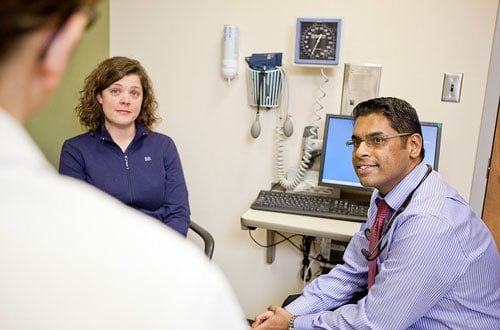
Nearly one in three lung cancer patients in the UK dies within three months of diagnosis, according to data published online in the journal Thorax.
The findings suggest that family doctors may not notice the signs of lung cancer early enough, according to researchers.
The UK’s survival rate for lung cancer lags behind other countries in Europe, statistics that tend to be blamed on late diagnosis.
Researchers analysed GPs’ approach to lung cancer between 2000 and 2013, using data from The Health Improvement Network (THIN) that contains the anonymous health records of millions of primary care patients across the UK.
Of 20,142 cases of lung cancer recorded by 444 GPs, one in 20 was recorded only on the death certificate and one in 10 died within a month of diagnosis. One in three died within 90 days and one in seven died in the first 30 days.
Dr Richard Roope, cancer lead for the Royal College of General Practitioners, said: “Lung cancer is notoriously difficult to diagnose in primary care, especially as a key symptom is coughing, which is present with numerous other conditions that GPs see every day.
“Taking into account the global picture, GPs across the UK are doing very well considering the meagre resources available to us; funding for general practice is at an all time low, we have a chronic shortage of doctors, and access to CT scanners, that would help in the diagnosis of lung cancer, is very limited in UK primary care.
“Instead of criticising GPs, we need to invest in general practice to allow us to employ more GPs and support staff and to give GPs more access to technology that could ultimately save our patients’ lives,” he added.
It found that 57% of all lung cancer deaths were in men and were 17% more likely to die early than women. The average age of diagnosis was 72, with those aged 80 and above being 80% more likely to die early than those who were diagnosed at a younger age.
The odds of an early death were lower among those who had a chest x-ray in primary care regardless of the number of times they had seen a GP before diagnosis, but the odds of an early death rose in tandem with the number of GP consultations a patient had.
Dr Michael Peake, honorary consultant and senior lecturer at the University of Leicester’s Glenfield Hospital, said he agreed that GPs need better tools to support their clinical decision making so that they can help patients from deprived areas who are more at risk of dying from lung cancer.
He commented: “The number of excess deaths linked to deprivation is large and the gap between the least and most deprived has not lessened over time. Improved targeting of public awareness campaigns to specific social groups is important so as not to widen this gap further.”
Further analysis indicated differences in consultation and investigation patterns for patients who died early compared with those who survived for more than three months.




